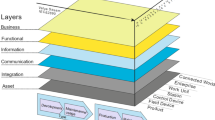Abstract
In the Industry 4.0 era, production planning problems are very relevant to production systems and are essential parts of the supply chain. Broadly speaking, production planning problems are tackled using models and methodologies, aiming for optimal solutions. This work introduces realism and stability to optimal production planning strategies using a holonic, product-driven manufacturing platform with increased flexibility. A model based on an anarchic holonic architecture and embedded intelligence logic provides decision-making capacity in a “production lot” in the face of disturbances. The proposed model is validated by comparing the results obtained with a lot-streaming mathematical programming model. Results show that significant changes in lot processing times (disturbances) generate significant changes in completion times. The proposed platform reduces up to 10.95% completion times in face of disturbances, generating significant benefits by increasing flexibility.
Access this chapter
Tax calculation will be finalised at checkout
Purchases are for personal use only
Similar content being viewed by others
References
Răileanu, S.: Production scheduling in a holonic manufacturing system using the open-control concept. UPB Sci. Bull. Series C 72, 1–4. ISSN 1454-234x (2010)
Shahzad, A., Mebarki, N.: Learning dispatching rules for scheduling: a synergistic view comprising decision trees. Tabu Search Simul. Comput. 5, 16 (2016). https://doi.org/10.3390/computers5010003
Fan, B.Q., Cheng, T.C.E.: Two-agent scheduling in a flowshop. Eur. J. Oper. Res. 252(2), 376–384 (2016). https://doi.org/10.1016/j.ejor.2016.01.009
Wu, C.-C., et al.: A two-stage three-machine assembly scheduling flowshop problem with both two-agent and learning phenomenon. Comput. Ind. Eng. 130, 485–499 (2019). https://doi.org/10.1016/j.cie.2019.02.047
Ma, A., Nassehi, A., Snider, C.: Anarchic manufacturing. Int. J. Prod. Res. 57, 2514–2530 (2019). https://doi.org/10.1080/00207543.2018.1521534
Role, M., Martinez, E.: Agent-based modeling and simulation of an autonomic manufacturing execution system. Comput. Ind. 63, 53–78 (2012). https://doi.org/10.1016/j.compind.2011.10.005
McFarlane, D., Sarma, S., Chirn, J.: The intelligent product in manufacturing control and management. IFAC 35, 49–54 (2002). https://doi.org/10.3182/20020721-6-ES-1901.00011
Kruger, K., Basson, A.H.: Evaluation criteria for holonic control implementations in manufacturing systems. Manuf. Syst. Mnt. J. Comp. Int. Man. 32, 148–158 (2019). https://doi.org/10.1080/0951192X.2018.1550674
Leitão, P., Rodrigues, N., Barbosa, J., et al.: Intelligent products: the grace experience. Control Eng. Pract. 42, 95–105 (2015). https://doi.org/10.1016/j.conengprac.2015.05.001
Wong, C.Y., McFarlane, D., Zaharudin, A.A., Agarwal, V.: The intelligent product driven supply chain. https://doi.org/10.1109/ICSMC.2002.1173319 (2014)
Herrera, C.: Cadre générique de planification logistique dans un contexte de décisions centralisées et distribuées. Université Henry Poincaré - Nancy. NNT: 2011NAN10046 (2011)
Yadav, A., Jayswal, S.C.: Modelling of flexible manufacturing system: a review. Int. J. Prod. Res. 56, 2464–2487 (2018). https://doi.org/10.1080/00207543.2017.1387302
Slack, N.: Flexibility as a manufacturing objective. Int. J. Oper. Manag. 3, 4–13 (1983). https://doi.org/10.1108/eb054696
Read, K.K.: Fuzzy rule generation for adaptive scheduling in a dynamic manufacturing environment. Appl. Soft. Comput. J. 8, 1295–1304 (2008). https://doi.org/10.1016/j.asoc.2007.11.005
Zhou, Y., Yang, J.J., Zheng, L.Y.: Multi-agent based hyper-heuristics for multi-objective flexible job shop scheduling: a case study in an aero-engine blade manufacturing plant. IEEE Access 7, 21147–21176 (2019). https://doi.org/10.1109/ACCESS.2019.2897603
Demirel, E., Azelkan, E.C., Lim, C.: Aggregate planning with flexibility requirements profile. Int. J. Prod. Econ. 202, 45–58 (2018). https://doi.org/10.1016/j.ijpe.2018.05.001
Stecke, K.E., Solberg, J.: Loading and control problem for a flexible manufacturing system. Int. J. Prod. Res. 19, 481–490 (1981)
Topaloglu, S., Kilincli, G.: A modified shifting bottleneck heuristic for the reentrant job shop scheduling problem with makespan minimization. Int. J. Adv. Manuf. Technol. 44, 781–794 (2009). https://doi.org/10.1007/s00170-008-1881-y
Ahmadi-Darani, M.H., Moslehi, G., Reisi-Nafchi, M.: A two-agent scheduling problem in a two-machine flowshop. Int. J. Ind. Eng. Comput. 9, 289–306 (2018). https://doi.org/10.5267/j.ijiec.2017.8.005
Gu, J., Gu, M., Cao, C., Gu, X.: A novel competitive co-evolutionary quantum genetic algorithm for stochastic job shop scheduling problem. Comput. Oper. Res. 37, 927–937 (2010). https://doi.org/10.1016/j.cor.2009.07.002
Choi, S.H., Wang, K.: Flexible flow shop scheduling with stochastic processing times: a decomposition-based approach. Comput. Ind. Eng. 63, 362–373 (2012). https://doi.org/10.1016/j.cie.2012.04.001
Wang, J., Zhang, Y., Liu, Y., Naiqi, W.: Multiagent and bargaining-game-based real-time scheduling for internet of things-enabled flexible job shop. IEEE Internet Things J. 6(2), 2518–2531 (2019). https://doi.org/10.1109/JIOT.2018.2871346
Tseng, C., Liao, C.J.: A discrete particle swarm optimization for lot-streaming flow-shop scheduling problem. Eur. J. Oper. Res. 191, 360–373 (2008). https://doi.org/10.1016/j.ejor.2007.08.030
Kumar, S., Bagchi, T.P., Sriskandarajah, C.: Lot streaming and scheduling heuristics for m-machine no-wait flowshops. Comput. Ind. Eng. 38, 149–172 (2000). https://doi.org/10.1016/S0360-8352(00)00035-8
Potts, C.N., Baker, K.R.: Flow shop scheduling with lot streaming. Oper. Res. Lett. 8, 297–303 (1989). https://doi.org/10.1016/0167-6377(89)90013-8
Trietsch, D., Baker, K.: Basic techniques for lot streaming. Oper. Res. 41(6), 1065–1076 (1993). https://doi.org/10.1287/opre.41.6.1065
Gharaei, A., Jolai, F.: A multi-agent approach to the integrated production scheduling and distribution problem in multi-factory supply chain. Appl. Soft. Comput. J. 65, 577–589 (2018). https://doi.org/10.1016/j.asoc.2018.02.002
Wilensky, U.: NetLogo. Center for Connected Learning and Computer-Based Modeling Northwestern University Evanston. http://ccl.northwestern.edu/netlogo/ (1999)
Yu, F., Wen, P., Yi, S.: A multi-agent scheduling problem for two identical parallel machines to minimize total tardiness time and makespan. Adv. Mech. Eng. 10, 1–14 (2018). https://doi.org/10.1177/1687814018756103
Author information
Authors and Affiliations
Corresponding author
Editor information
Editors and Affiliations
Rights and permissions
Copyright information
© 2021 The Author(s), under exclusive license to Springer Nature Switzerland AG
About this paper
Cite this paper
Sáez Bustos, P., Herrera López, C. (2021). Implementation of a Holonic Product-Based Platform for Increased Flexibility in Production Planning. In: Trentesaux, D., Borangiu, T., Leitão, P., Jimenez, JF., Montoya-Torres, J.R. (eds) Service Oriented, Holonic and Multi-Agent Manufacturing Systems for Industry of the Future. SOHOMA 2021. Studies in Computational Intelligence, vol 987. Springer, Cham. https://doi.org/10.1007/978-3-030-80906-5_12
Download citation
DOI: https://doi.org/10.1007/978-3-030-80906-5_12
Published:
Publisher Name: Springer, Cham
Print ISBN: 978-3-030-80905-8
Online ISBN: 978-3-030-80906-5
eBook Packages: Intelligent Technologies and RoboticsIntelligent Technologies and Robotics (R0)




